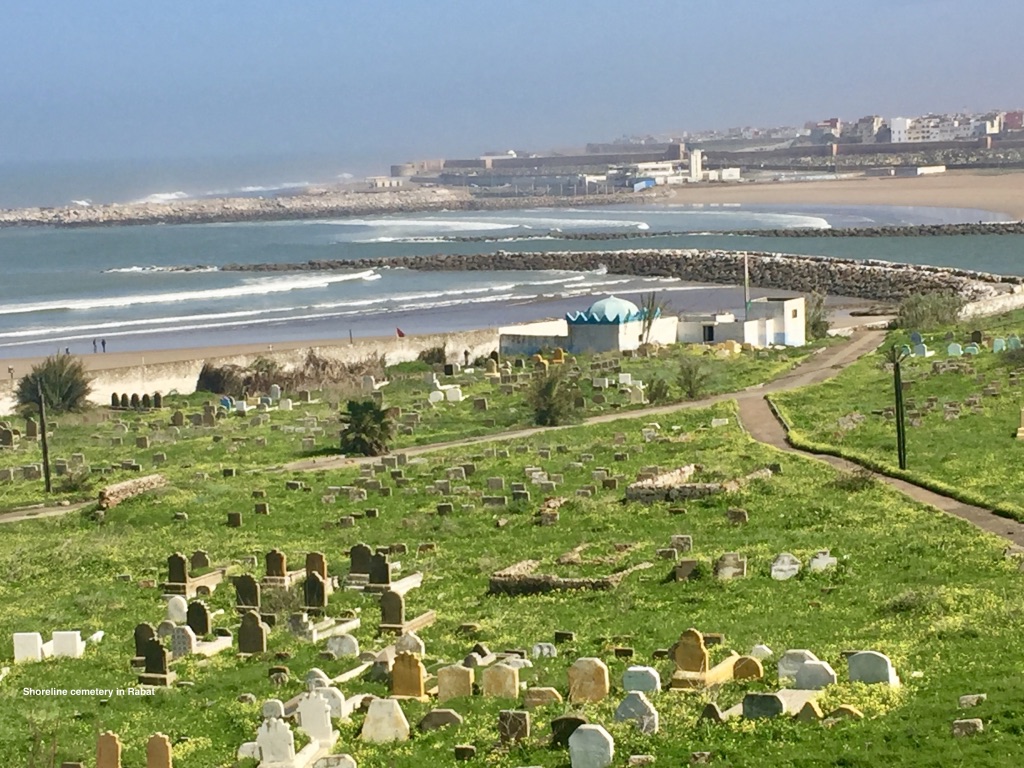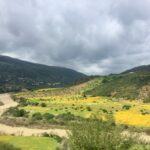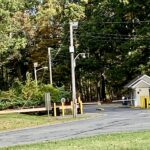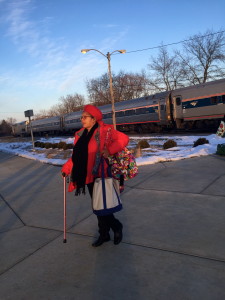
Passenger arrives at East Lansing Amtrak station
Amtrak’s daily Blue Water train carries passengers departing Chicago’s Union station at 4:00pm through to Port Huron, Michigan near the Canadian border arriving at 11:38pm. Seniors, people with disabilities, families traveling with young children, military personnel and business class passengers are called first to board. The seniors are talking about their previous train trips and the weather. A winter storm is wreaking havoc on the East Coast. A middle-aged woman with long, yellow hair joins them. She slips her hands into the pockets of her jacket. Across its front in black and orange lettering are the words Harley Davidson. She has no visible characteristic for being in the priority boarding line.
On the Blue Water we are not given seat numbers. Passengers sit wherever they want. The Coach cars are old with worn blue upholstery and no foot rests. However, there is something special about this Midwest train. The Federal Railroad Administration designated a 97-mile stretch of its route as a high-speed rail corridor.
Half of the seats are facing one way and the others are facing in the opposite direction. It isn’t until we begin moving I realize I am facing backwards. The woman with the yellow hair wearing the Harley jacket is seated behind me.
“I’ve never ridden a passenger train facing backwards,” I say.
“It doesn’t matter. It will be dark in an hour or so,” she says. Her words are slowly drawn. The accent is a hybrid of different regions. I want to hear more of it.
“Do you ride trains often?”
“No. I haven’t ridden a train for twenty years.”
“Where did you get on?”
“Carlinville, Illinois. That train was much nicer than this one.”
“Which one was it?”
“I don’t know.” She hands me her ticket and I see it is the Texas Eagle.
Carlinville is an hour drive south of Springfield, Illinois with a population of about 6,000. Still guessing about her accent, I ask: “Where are you going?”
“Flint.” With a punctuated pause the word falls flat. The city is in the news because its water system is contaminated with lead. Heavily covered by the media, the story gets bigger as time passes. The Detroit Free Press reported that state workers in Flint received purified water at a time when the state government denied to the public any problem with the tap water. Some people are calling for Governor Snyder to resign.
“Why are you going there?”
“I’ve got a family in crisis. Fortunately most of them are on wells, but not all.” She’s leaning back in the reclined seat with sloped shoulders. “I grew up in Flint.” She looks out the dirty train window and says nothing more.
A father with his nine-year old son is sitting across the aisle from me. His face looks puzzled.
“Is this your first train ride?” I ask.
“Yes. I want it to be good. I’m going to find forward facing seats. I like seeing where I’m going, not where I’ve been.” He and the boy grab their bags and leave. They don’t return.
The conductor comes by and scans the QR code on the ticket I printed at home. We’re crossing over Interstate 90 in Chicago at rush hour. The automobile headlights and taillights look like red and white cells moving through the city’s arteries. The train radio crackles while a male voice announces the café car is open. A Norfolk Southern locomotive flashes past.
At 4:23pm we are in Hammond, Indiana. The shoreline of Lake Michigan is icy and the industrial stacks puff out smoke. Some of the large buildings are abandoned, creating metal ghost towns. Dormant, straw-colored grass waits for spring.
The train slows to a glide and tilts east. I hear the crinkling of food wrappers. A couple of college kids are deciphering the package ingredients. They are scanning it for how many grams of sugar it contains.
Outside of New Buffalo the conductor announces the high-speed segment, “Be careful walking.” I go to the café car where only two Amtrak service attendants are present. On my way back I stop to talk with the yellow haired, Harley lady sitting behind me.
“I noticed your accent but can’t place it. It sounds kind of Southern.”
“I lived in Biloxi, Mississippi for most of my adult life,” she says.
“How long have you been traveling?”
“Since 9:00am. My train was 20 minutes early into Chicago.” The Blue Water is scheduled to arrive in Flint at 10:00pm. She angles her body towards the window – a sign she’s had enough conversing.
No curtains cover the windows. Fluorescent lights shine dimly on the nearly empty overhead luggage rack. The train’s continuous movement rebuffs the night’s stillness. The car is quiet. I hear only the train whistle blowing long, long, short, long as we approach grade crossings. Trains have their own language. One long blast tells passengers on station platforms to get on board. Two short whistles mean the train is moving forward.
Her flip phone rings. I listen to the one-way conversation.
“They’ve got filters. And bottled water. What are they doing for baths? Dave’s got well so he’s okay, right? Let me know what’s going on. I will see you on Sunday. We’ll talk when the time comes. I was nervous but it will be all right. This is the only way I get to be adventurous. Sounds good. Love you too.”
She ends her phone conversation and asks: “Do you know where we are?” I look at my timetable schedule.
“Is everybody ok?” I ask.
“Better than me.”
“Why?”
“Four weeks ago I was diagnosed with macular degeneration. I’m legally blind,” she says incredulously. “I can’t drive anymore.”
I ask her name. She hesitates and doesn’t tell me. I’m sure she’d rather be riding a Harley than this train.
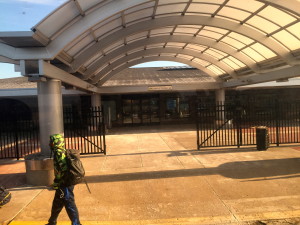
Battle Creek, Michigan Amtrak station
At Battle Creek, Michigan we wait longer than usual at the station stop. The crew changes out. During this time, we talk more. We learn we have sons the same age attending state schools in Illinois. We are both divorced. With mine more recent than hers. That the years we anticipated after our children were grown will not be what we had expected. I tell her: “I didn’t want to be the same person after my divorce as I was before it. I had to do something different. So I got on a train.”
She then tells me her name: “Linda.”
Like places, some people are easy to connect with and others are difficult. It may not be them, but the situation they find themselves in that is difficult. I am reminded of what I need to give in order to gain trust. It may take showing vulnerability or empathy, sharing common interests, or just being honest. Whatever it takes, I always feel the effort is worthwhile. Linda will arrive in Flint around 10:00pm, early enough to greet her family. Without the high-speed rail segment it could be closer to 11:00pm, an inconvenient time for a family in crisis and a woman traveling alone. I’m glad Michigan decided that high speed rail is worth the effort.
The train arrives in East Lansing, Michigan at 8:45pm, ten minutes early. I get off and walk towards a brand new station building with glass walls. It recently opened as the East Lansing Intermodal Center. A hotel shuttle pulls up and in a few minutes I’m on the campus of Michigan State University.


